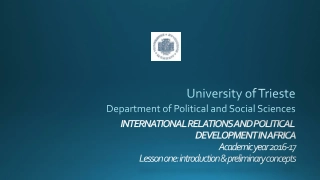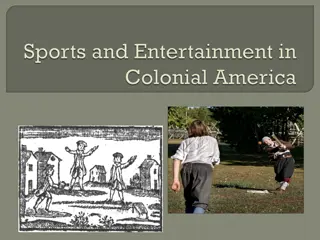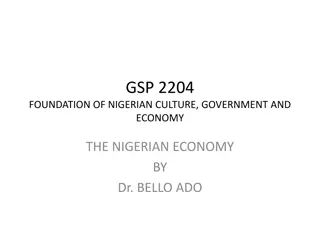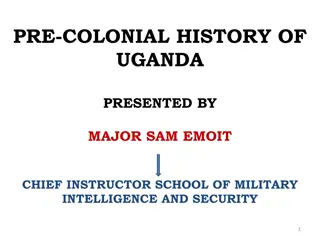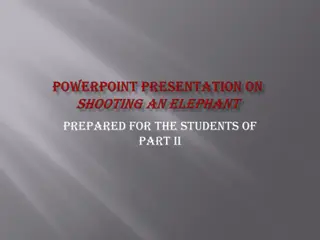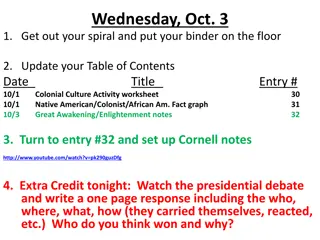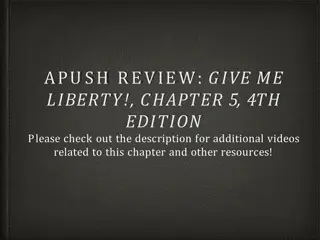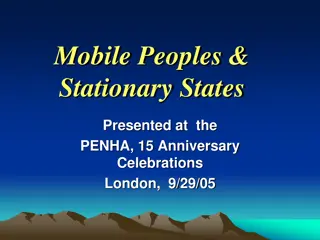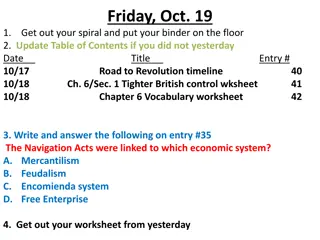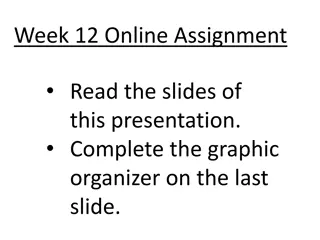State Evolution in Africa: Political Development & Modernization
Delve into the trajectory of African states, examining colonial legacies, challenges to statehood, and the shift to modern governance structures. Explore the pivotal role of states in international and internal politics in Sub-Saharan Africa. Analyze the attributes and functions of modern states, fr
0 views • 26 slides
Theories Explaining Deviant Sexual Behavior Throughout History
Explore historical theories on deviant sexual behavior, including demonological, anomie, psychoanalytical, human ecology, and somatotyping theories. These theories range from supernatural beliefs of possession to scientific interpretations of societal influences and individual characteristics.
2 views • 33 slides
Colonial Acts and Conflicts in American History
Key historical events such as the French & Indian War, the Proclamation of 1763, and the Quartering Act are explored, shedding light on critical laws, conflicts, and tensions that shaped colonial America. The discussion covers acts imposed by the British government, the impact on settlers and Native
5 views • 15 slides
Attitudes Toward Sports Among Colonial Settlers in the New World
The attitudes of European colonial settlers towards sports in New England, the Middle Colonies, and the South were deeply influenced by their religious backgrounds. While Puritans in New England were generally against play, Quakers and Dutch Calvinists in the Middle Colonies were more accepting. In
0 views • 19 slides
Understanding House Styles: A Brief Overview
House styles encompass a variety of architectural designs, with buildings classified based on shared characteristics like roof shape, window placement, and construction materials. Early American house styles, such as American Colonial, reflect the diverse origins of settlers in North America. Coloni
3 views • 25 slides
Architecture in Colonial India: A Blend of Cultures
British Colonial architecture in India during the 17th to 20th centuries combined Hindu, Islamic, and Western elements, leading to the unique Indo-Saracenic style. This architectural era saw the construction of institutional and civic buildings showcasing a mix of Gothic, Neo-Classical, Indo-Islamic
0 views • 9 slides
Psychological Theories of Criminality: Understanding the Roots
Psychological theories of criminality delve into the association between intelligence, personality, learning, and criminal behavior. Major theories include Psychodynamic Theory by Freud, Behavioral Theory by Bandura, and Cognitive Theory by Kohlberg. These theories explore how unconscious mental pro
1 views • 20 slides
Evolution of Medicine in Colonial South Asia
The evolution of medicine in colonial South Asia witnessed a transition from local traditional practices to the dominance of imported European medicine. This shift, marked by the establishment of imperial institutions and training of local physicians in Western techniques, led to a complex interplay
1 views • 5 slides
Exploring Leadership Theories: Traits and Behaviors
Leadership theories have evolved from trait theory focusing on personal qualities to behavioral theories emphasizing actions and interactions. While early research sought universal traits for leadership, it encountered challenges due to varied traits among leaders and non-leaders. Behavioral theorie
2 views • 29 slides
Indigenous Economy of Pre-Colonial Nigeria
The indigenous economy of pre-colonial Nigeria was characterized by agriculture, local industries, crafts, trade, and services. Agriculture was the primary activity, with various crops grown and other occupations like hunting and fishing. Local industries included weaving, pottery, blacksmithing, an
0 views • 22 slides
Unraveling COVID-19 Conspiracy Theories and Hoaxes
Exploring various conspiracy theories surrounding the origins of COVID-19, from bat soup to bioweapons and espionage. Dive into wilder theories involving population control, world war, and even Disney's supposed predictions. Understand the differences between conspiracy theories and hoaxes, shedding
2 views • 11 slides
Language Controversy and Political Awakening in Colonial India
Urdu-Hindi language controversy in colonial India sparked a significant cultural and political divide between Hindus and Muslims, leading to the emergence of the Two-Nation Theory. This controversy, along with events like the formation of the Indian National Conference, highlighted growing tensions
0 views • 45 slides
Understanding Sociological Theories and Frameworks
Sociological theories, encompassing micro and macro perspectives, provide a lens to interpret societal dynamics. Consensus theories like functionalism emphasize shared norms, while conflict theories such as Marxism highlight social inequalities. Social action theories like interactionism focus on in
3 views • 21 slides
Online Seminar: Theories of Learning in Initial Teacher Education
This collection of online seminar slides introduces pre-service teachers to major theories of learning, including the Science of Learning through cognitive neuroscience. The presentation aims to help educators consider implications for teaching, recognize theories in action, and pose critical questi
1 views • 11 slides
Understanding Uganda's Pre-Colonial History through Major Sam Emoit's Presentation
Delve into the pre-colonial history of Uganda as presented by Major Sam Emoit, Chief Instructor at the School of Military Intelligence and Security. Explore the way ancestral Ugandan communities lived, their tools, social patterns, and interactions before colonial rule. Discover the diverse methods
0 views • 127 slides
Education in Colonial Times: A Historical Overview
Education in colonial times varied across different regions in America. The Northern colonies emphasized education with schools like Harvard College, while the South lacked formal education laws pre-Civil War. In the middle colonies, education was deemed important but left to families until laws wer
0 views • 10 slides
Theories of Causation in Psychological and Social Sciences
Overview of theories of causation categorized into psychological, social psychological, and sociological perspectives. Psychological theories focus on instinctive, biological, and psychological qualities of abusers, including Attachment Theory, Psychodynamic Theory, Social Learning Theory, and Situa
0 views • 15 slides
Evolution of Colonial Architecture in British India
The British Colonial era in India spanned over three centuries from 1615 to 1947, leaving a lasting impact on the country's architecture. The fusion of Hindu, Islamic, and Western elements gave rise to the distinctive Indo-Saracenic style, showcased in various institutional and civic structures. Exp
0 views • 16 slides
Exploration of Colonial Discourse in George Orwell's "Shooting an Elephant
George Orwell's "Shooting an Elephant" delves into the psychological conflict of a police officer upholding British imperial rule in Burma. The narrative unravels Orwell's ambivalence towards colonialism, his struggles with authority and identity, and the complexities of power dynamics and moral res
5 views • 17 slides
Introduction to Quantum Chromodynamics & Field Theories in High-Energy Physics
Explore the fundamentals of Quantum Chromodynamics and Classical Field Theories in this informative lecture, covering topics such as global and local symmetries, Lagrangians, actions, and dynamics. Understand the significance of global and local symmetries in classical field theories, along with exa
2 views • 17 slides
Comprehensive Overview of Student Affairs Theories
This collection explores key theories in student affairs, including cognitive-structural theories, learning theories, and person-environment theories. Cognitive-structural theories delve into how individuals process information, while learning theories examine how people absorb knowledge. Person-env
3 views • 19 slides
Understanding Theories and Concepts in Research
The content delves into the fundamental concepts of theories and variables in research. It discusses the nature of theories, including descriptive, explanatory, and predictive theories. Additionally, it examines the role of concepts in providing identity and meaning to objects and phenomena. Through
1 views • 55 slides
Classical Trade Theories and Their Limitations in International Economics
Classical trade theories such as the Theory of Absolute Advantage by Adam Smith and the Theory of Comparative Advantage by David Ricardo highlight the benefits of free trade and specialization based on natural advantages. However, these theories have limitations, such as the inability to explain sce
0 views • 8 slides
Welcome to Colonial Cafe Orientation
Explore the comprehensive orientation agenda at Colonial Cafe, covering essential topics such as company history, mission, job expectations, benefits, and training. Learn about the Cherry System, growth opportunities, and the company's commitment to providing excellent service and quality food. Get
0 views • 28 slides
History of Malaysia: From Pre-history to Colonial Rule
Malaysian history traces back to the migration of Proto-Malays from China, development of trade ports, adoption of Buddhism, Hinduism, and Islam, the rise of the Malacca Sultanate, and European colonial rule by Portugal and the Dutch. The region's rich history is marked by cultural exchanges, trade
0 views • 12 slides
Understanding Colonialism and Imperialism in Modern History
The discussion revolves around the impact of colonialism and imperialism on international relations, focusing on the historical context, economic consequences, and nationalist movements against colonial powers. Highlighting key players such as Great Britain, France, and Germany during the 19th centu
2 views • 14 slides
Applying Theories and Models in Integrated Health: Module 3 Overview
This module delves into the application of various theories, perspectives, and practice models in integrated healthcare. Students will learn to utilize different theories to enhance their understanding and practice in integrated health, focusing on aspects like personal impact, behavioral change the
0 views • 78 slides
American Colonial History and Representative Government Study Guide
Study guide for American colonial history and representative government covering topics such as Colonial Culture, the Great Awakening/Enlightenment, Ben Franklin, and Roots of Representative Government including Magna Carta, Parliament, English Bill of Rights, Glorious Revolution, salutary neglect,
0 views • 4 slides
Colonial Culture and The Great Awakening: Overview and Impact
This content covers activities and notes related to Colonial Culture, Native Americans, Colonists, and the African American community. It also delves into the Great Awakening and Enlightenment period, discussing the religious movement in the 1730s-1740s. Traveling ministers, such as Jonathan Edwards
0 views • 13 slides
Accelerating Lemma Learning Using Joins in Satisfiability Modulo Theories
Explore the use of joins in accelerating lemma learning within the context of Satisfiability Modulo Theories (SMT). The study covers various SMT applications at Microsoft and delves into the development of the Z3 solver. Key topics include theories, arithmetic operations, array theory, uninterpreted
0 views • 25 slides
European Colonial Encounters 1750-1914: Paths to Imperialism
Second wave European conquests in the 18th and 19th centuries saw a shift towards informal control and military force in establishing empires in Africa and Asia. Various paths to colonial status emerged in India, Indonesia, Australia, and New Zealand, reflecting different colonization methods and ou
0 views • 21 slides
The Crisis Begins: Impact of the Stamp Act and Colonial Resistance
The Crisis Begins Chapter from "Give Me Liberty!" discusses the repercussions of the 7 Years War and the end of salutary neglect, leading to new trade regulations and increased taxation on colonists. The imposition of the Stamp Act without colonial consent sparked widespread resistance, with the eme
0 views • 14 slides
European Colonial Competition in East Africa
The division of African territories by European powers, such as Britain, France, and Italy, led to conflicts and negotiations in the Horn of Africa. Menelik, an African leader, challenged European colonialists, resulting in the famous Battle of Adwa. The aftermath of the battle saw a shift towards n
0 views • 25 slides
Colonial Rebellions and Reactions in Early America
The Colonial Rebellions in early America, such as Bacon's Rebellion and the Stono Rebellion, exemplified the growing tensions and conflicts within the colonial society. These uprisings highlighted issues of class struggle, disparity in social status, and led to significant consequences such as the f
0 views • 7 slides
Theories and Concepts in Semantics: Classical vs. Prototype Approaches
Explore different theories of concepts in semantics, including classical theories based on necessary and sufficient conditions, causal theories, and prototype theories. Compare their strengths and limitations in handling fuzziness, asymmetry, and internal structure of concepts. Discover how experime
0 views • 46 slides
Integrating Theories and Models for Enhanced Health Practice
Explore the application of theories, perspectives, and practice models in integrated health through Module 3. Learn how theories guide assessment, treatment, and patient outcomes. Discover common theories enhancing assessment and supporting individuals through grief and loss. Gain insights into the
0 views • 78 slides
Comprehensive Overview of Leadership Theories and Styles
Leadership encompasses the ability to influence a group towards achieving goals by knowing oneself, communicating vision, building trust, and taking effective action. Various leadership styles include Autocratic, Democratic, Free-Rein, and Paternalistic, each with distinct decision-making approaches
0 views • 19 slides
Colonial Challenges Under British Rule
In this academic material, students are instructed to update the Table of Contents and engage with resources related to tighter British control over the colonies. The tasks include exploring historical events like the Proclamation Act of 1763, Quartering Act, Sugar Act, Stamp Act, Declaratory Act, a
0 views • 18 slides
Exploring Anthropology of Art: Perspectives and Studies on Cultural Expressions
This text delves into the intersection of anthropology and art, focusing on the importance of anthropological approaches in studying artistic subjects. It covers various topics such as the nature of art, methodologies, theoretical frameworks, and case studies. The discussed themes include the role o
0 views • 7 slides
Cultural Contrasts in Colonial Texas - Anglos vs Mexicans
The cultural differences between Anglos and Mexicans in Colonial Texas were evident through contrasting perspectives on power structures, military involvement, slavery, and governance. Anglos advocated for civilian rule and believed in the military serving the people, while Mexicans emphasized power
0 views • 6 slides
